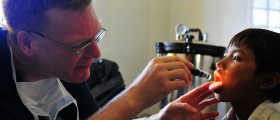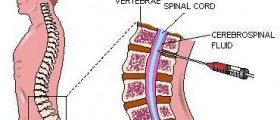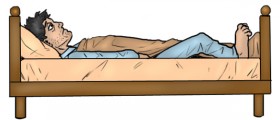
Tourrete SyndromeTourette syndrome (TS) is a neurological disorder characterized by sudden and repetitive movements or sounds that are called tics. If tics are severe and last longer than one year it is known as chronic tic disorder. Sometimes, these tics can be part of Tourette syndrome. Tourette syndrome is named after Dr. Georges Gilles de la Tourette, who first described the condition in 1885.
Early symptoms of TS are commonly seen in childhood and onset is between 7 and 10 years of age. Males are more prone to Tourette syndrome than females. It is estimated that it appears three to four times more often in men than it does in women. It is considered that 200,000 of American population suffer from the most severe form of TS. Symptoms of Tourette syndrome may last a lifetime but usually the worst symptoms are present in early teenage.
Symptoms of Tourrete Syndrome
The main symptoms of TS are motor or vocal tics. Tics can be grouped in simple or complex tics.
Simple motor tics occur suddenly and separately from other tics and involve just a few muscles. These tics include facial grimaces, blinking of the eyes, shoulder shrugging and head jerking. Simple vocal tics can be throat clearing, sniffing and grunting sounds.
Complex motor tics include several muscle groups. It can be facial grimacing in combination with twisting of head and shoulder shrugging. Person might touch part of the body or another person repeatedly. Also, complex motor tics can be hopping, jumping, bending, or twisting. Complex vocal tics may include words or phrases. Repeating other people’s words is a complex vocal tic called echolalia. Involuntary swearing is called coprolalia.
Frequently, tics are worsening with excitement or anxiety. During sleep, tics can be present but considerably reduced.
Causes of Tourette SyndromeExact cause of TS is unknown but it is believed that Tourette syndrome occurs due to changes in the brain and imbalance of neurotransmitters. Associated disorders are frequently seen in persons affected by this syndrome. These disorders can be: attention deficit/hyperactive disorder, difficulties with impulse control, obsessive-compulsive disorder, learning disabilities, or sleep disorders.
TS is not life-threatening condition but in some autopsies there were reported abnormalities in basal ganglia.
Treatment
There is no cure for Tourette syndrome. Treatment aims to help control the tics that interfere with everyday activities. This includes medications for relieving symptoms such as: drugs that block or deplete the neurotransmitter dopamine in the brain, botulinum toxin type A injections, stimulant medications, central adrenergic inhibitors and antidepressants. Additionaly, patients may receive psychotherapy and deep brain stimulation.

















Your thoughts on this
Loading...